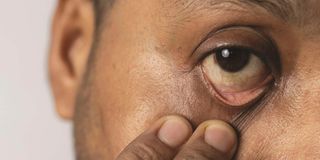What the eyes reveal about your health

When the skin and whites of the eyes look yellow, this could be an indication of jaundice, a liver disease.
What you need to know:
- During eye examination, a doctor can learn a lot about your overall health. For example, he/she may spot signs that you have diabetes, cancer, heart and liver diseases.
- Regular eye examinations allow for early detection and treatment of various health conditions.
Red, itchy eyes
If your eyes are red, itchy, burning or watery, you may be allergic to something. A variety of allergens such as pollen, dust mites or cigarette smoke may affect the eyes. An allergist (a medical practitioner specialising in the diagnosis and treatment of allergies) can help determine the cause of allergies if you suffer from any of these symptoms. Red eye without itching can be a sign of various systemic diseases such arthritis, hypertension and autoimmune problems
Vision loss
Sudden loss of vision (a swift, usually unexpected, loss of the ability to see well or to see at all) may indicate that you are not getting enough blood flow to the brain or eyes. This could be an early sign of stroke or migraine headache. Other causes could be a brain tumour, retinal bleed or a retina that has separated from the back of the eye.
Blurred vision
Blurry eyes can be a sign of diabetes. Diabetes retinopathy occurs when high blood sugar levels cause damage to blood vessels in the retina. Sometimes abnormal new blood vessels grow on the retina.These blood vessels can swell and leak. Or they can close, stopping blood from passing through. This causes blurry vision and can result to vision loss. Diabetes can also make it difficult to see at night or in dim light.
Droopy eyelid
A droopy eyelid can be caused by a stroke, an eyelid or brain tumour, or cancer of the nerves or muscles.
Droopy eyelids could also be a symptom of myasthenia gravis, a disease that causes the immune system to attack the muscles and weaken them. This mainly affects eye, facial and throat muscles, making chewing, swallowing and even speaking difficult.
Yellow eyes
When the skin and whites of the eyes look yellow, this could be an indication of jaundice, a liver disease.
Jaundice is caused by elevated bilirubin levels produced by the liver when it’s inflamed or damaged. This may be a result of poor diet, cancer, infection or prolonged alcohol misuse.
Bulging eyes
Protruding or bulging eyes can be a sign of many diseases; thyroid gland dysfunction or Grave’s disease being the most common. This is when the thyroid gland produces excessive hormones, which can cause double vision and vision loss.
With Graves’ disease, the immune system attacks the tissue around the eyes, causing them to swell and push forward, giving them a “bulging” appearance.
Night blindness
Difficulty seeing in dim light or while driving at night may be a sign that cataracts are developing in the eyes. Cataracts grow gradually over time without causing any pain or significant discomfort and are the most common cause of vision loss in adults over 45 years.
In rare cases, night blindness can be due to a vitamin A deficiency. Supplements or a diet rich in vitamin A-rich foods such as beef liver, sweet potatoes, spinach, carrots and pumpkins are generally recommended to treat the deficiency and improve night vision.
Eye twitches
Eye twitches are common, generally harmless and typically disappear on their own. They have been linked to alcohol and caffeine consumption, fatigue, insufficient sleep, stress and smoking.
Frequent eye twitches could be a sign of a neurological system disease such as multiple sclerosis.
Rings around the cornea
Corneal arcus is a condition that causes a gray-white line of fat deposits on the edge of the cornea, which can be a sign of cardiovascular disease. These deposits can sometimes form a complete white-coloured ring on the cornea.
This is of little concern for people aged 50 and above. However, in those aged below 40, there is need to contact an eye specialist since the condition can signal cardiovascular disease.
Dr Alain is a consultant ophthalmologist and vitreo-retinal specialist at Aga Khan University Hospital, Nairobi




